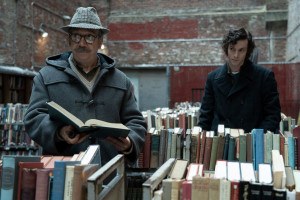A Cultural Take on the B's Stanley Cup
So it’s the morning after the Boston Bruins have brought the Stanley Cup back to the Hub for the first time in 39 years. Strange to think that the firm of Orr & Co. last held this trophy aloft around the time I was having my first birthday. Indeed, such a longeur between championships in the Hub of Hockey and the epic way that the Bruins did it leaves this fan feeling a bit philosophical. It’s hard to write about the arts and culture when I just have hockey on the brain, especially since it was a late night last night, but here’s the thing: This Stanley Cup series felt like a great moment in pop culture in and of itself. I want to read the inevitable stack of books and see the movie about this series, which played out like a 21-hour drama on ice … if you don’t count all of the trash-talking and debates over finger-biting and concussions that took place because of it.
At the start of this series, Boston fans didn’t know too much about the Vancouver Canucks, but by Game 7, they were deemed just about as evil as, well, the Evil Empire itself. Indeed, Channel 7 previewed the game with a long clip from Miracle, that movie about the 1980 U.S. hockey team of Eruzione & Co. that knocked off the unstoppable Commies of the Soviet Union team. (Of course, it bears repeating that the Americans knocked off Finland, not the USSR, in the gold medal game, but I digress.) In the clip on Channel 7, there was Kurt Russell, playing the late coach Herb Brooks and delivering the dramatized motivational speech for the ages. It was stirring to a degree, of course, but also a tad ridiculous. Suggestions of U.S. jingoism make no sense in the NHL, which is a truly international league of professional players. After all, the Bruins have more Canadians on their team than the Canucks and just three American-born players. (That being said, it’s the goalie from Flint, Mich., who won the Conn Smythe MVP trophy. He’ll get the last word in this column.)
Indeed, I would have preferred that they used clips of every hockey player’s favorite comedy, Slap Shot. That 1977 Paul Newman romp would have been more fun. And besides that story about a sadsack bunch of goons who win it all has the kind of bad behavior truly fitting of this series. The amount of cartoonish (and destructive) violence in these seven games did make it seem like the Hanson Brothers and the rest of the Charlestown Chiefs were having a vicious intersquad match.
Beyond that, I realized, hockey lacks iconic representations in pop culture, at least in comparison to the other big three North American sports. Aside from Miracle or Slap Shot, what other clips could the station have run? Russell Crowe as a small-town guy taking on the New York Rangers in Mystery, Alaska? Adam Sandler as a hockey thug in Happy Gilmore … even though it’s really about how he picked up golf? Or maybe some clips of The Mighty Ducks and its many sequels? After all, Boston left winger Shawn Thornton won his first Stanley Cup with the Anaheim “They’ll Always Be Mighty” Ducks in 2007.
I ask any reader of this somewhat bleary post to tell me what their favorite hockey movie is and why. Then tell me what your favorite hockey song is because it’s still odd how little hockey is represented in music. There’s no “Centerfield” that I know of, which surprises me, since Canada, after all, has produced so many of our favorite songwriters from Neil Young to Joni Mitchell, to Rush and the Barenaked Ladies, to Great Big Sea and Sloan, and so on. There are just few songs explicitly about hockey. Growing up in Connecticut, I always loved “Brass Bonanza”, the theme of the now-long-gone Hartford Whalers, but that was an instrumental. Otherwise, one can’t ever forget “I Want to Drive the Zamboni”, by the Zambonis, once they hear it … though that’s not necessarily a compliment.
But for this sensitive wuss, the best hockey song of all time is by Canadian art-folk singer Jane Siberry, who wrote a very humble little tune on her excellent 1989 album Bound by the Beauty. Called simply “Hockey,” it’s not a pump-you-up “Rock & Roll Pt. 2” kind of song, but a quiet little observation of a day on a frozen lake where the neighborhood kids play. And though Siberry is probably thinking of her native Ontario, it’s easy to see this scene playing out all over New England as well:
Winter time and the frozen river / Sunday afternoon they’re playing hockey on the river / Rosie … he’ll have that scar on his chin forever / Someday his girlfriend will say “hey, where. .. ?”/ He might look out the window … or not / You skate as fast as you can ’til you hit the snowbank–that’s how you stop / And you got your sweater from the catalog / You use your rubber boots for goal posts / Ah … walkin’ home / Don’t let those Sunday afternoons get away get away get away get away …
This song is my unlikely candidate for best hockey song of all time, if just because it perfectly captures why the culture around hockey has an emotional, cultural pull. It’s an ingrained part of life in cold regions, even if the people who play it and watch it never set foot near an NHL arena.
There’s a certain poetry to hockey beyond the flash and the fights and a wistfulness for those simple times on the ice. Easily, my favorite literary description of hockey that captures this feeling comes from Studs Terkel’s Working, the legendary interviewer’s collection of monologues about the workplace. For this 1972 book, he interviewed Eric Nesterenko, who was then on the verge of retiring after playing for 20 years with the Toronto Maple Leafs and the Chicago Blackhawks. (Oddly enough, he ended up playing Rob Lowe’s dad in the terrible 1986 hockey movie Youngblood.) Known for being a sharp-elbowed player (think today’s Brad Marchand on the Bruins), Nesterenko talks for eight pages in Working about being a journeyman, long travel, uncaring owners, and injuries, but then leaps into rhapsodic rhetorical flight at the end, which is more than worth quoting in full:
I still like to skate. One day last year on a cold, clear, crisp afternoon, I saw this huge sheet of ice in the street. Goddamn, if I didn’t drive out there and put on my skates. I took off my camel-hair coat. I was just in a sort of jacket, on my skates. And I flew. Nobody was there. I was free as a bird. I was really happy. That goes back to when I was a kid. I’ll do that until I die, I hope. Oh, I was free!
The wind was blowing from the north. With the wind behind you, you’re in motion, you can wheel and dive and turn, you can lay yourself into impossible angles that you never could walking or running. You lay yourself at a forty-five degree angle, your elbows virtually touching the ice as you’re in a turn. Incredible! It’s beautiful! You’re breaking the bounds of gravity. I have a feeling this is the innate desire of man.
(His eyes are glowing.) I haven’t kept many photographs of myself, but I found one where I’m in full flight. I’m leaning into a turn. You pick up the centrifugal forces and you lay in it. For a few seconds, like a gyroscope, they support you. I’m in full flight and my head is turned. I’m concentrating on something and I’m grinning. That’s the way I like to picture myself. I’m something else there. I’m on another level of existence, just being in pure motion. Going wherever I want to go, whenever I want to go. That’s nice, you know. (Laughs softly.)
If that passage doesn’t make you want to hug your nearest hockey player, then go watch those nerds play the U.S. Open with my compliments.
So how do these two passages — admittedly not the most rabble-rousing of choices — apply to this Bruins championship? Simple: goalie and Stanley Cup MVP Tim Thomas, who played hard and anonymously for years in Finland and in the minors and as a backup, and who is today, at age 37, the city’s No. 1 sports hero. Because of his travels, Thomas has been a wry, philosophical post-game interview, and he continued to be so, even when the shenanigans between the Bruins and Canucks got out of hand. And in a press conference before the final game, when he was asked about how he dreamed of this moment, his nostalgia came through just as clear as the Siberry song or the Nesterenko quotation. “When we’re in the garage or driveway playing as a kid and you’re fantasizing, well, I was [legendary Detroit Red Wing center] Stevie Yzerman, which doesn’t make sense for a goalie,” Thomas said. “but you’re saying to yourself, ‘Game 7 of the Stanley Cup finals’ you’re not saying Game 6, you know? So this is really what every kid dreams about.”
And now that the dream has come true, and after hearing Thomas in his postgame interviews reminiscing graciously afterward — Conn Smythe trophy at his side — of how much he appreciated being a journeyman in Finland all those years … it’s not hard to see how perhaps hockey has few stirring pop culture moments because they will always pale in comparison to the game itself.


